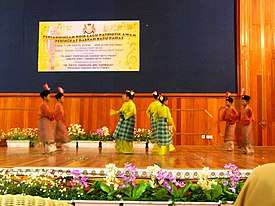Zapin
Zapin (Jawi: زافين) is a Malay dance form that is popular in Malaysia (especially in the state of Johor, Pahang and Selangor), in Indonesia, especially in Malay-populated provinces in Sumatera (Riau Province, Jambi province, Riau Islands Province, North Sumatera, and Bangka-Belitung Islands) and West Kalimantan, and in other Malay populated countries like Brunei Darussalam and Singapore. It is believed to have been introduced by Arab, Muslim missionaries from the Middle East in the fourteenth century.

| Zapin |
|---|
|
| Burma |
| Cambodia |
|
| Indonesia |
|
| Laos |
| Malaysia |
| Philippines |
| Thailand |
| Vietnam |
In the old days, only males were allowed to perform; nowadays, female dancers are included. It used to be performed exclusively for religious ceremonies but through the years it has become a form of traditional entertainment, hence the participation of female dancers is allowed.
The dancers usually perform in pairs and are accompanied by musicians playing the accordion, violin, gambus (short-necked lute), marwas (bongos) and occasionally using kompang (small drum).
It was also introduced to Singapore and Brunei before the colonial days of Singapore. It was believed that it was introduced to Singapore in 1937.
There are numerous types of zapin, and each type varies by the movement and style of dance:
- Zapin Api (Riau)
- Zapin Melayu Johor (Johor)
- Zapin Pulau
- Zapin Tenglu
- Zapin Tenglu 2
- Zapin Lenga
- Zapin Pekajang
- Zapin Arab
- Zapin Jambi (Jambi Province)
- Zapin Singapura (Singapore)
- Zapin Sindang (Sarawak)
- Zapin Sekaki (North Sumatera)
- Zapin Pesisir (Riau Islands Province)
- Zapin Tembung (West Kalimantan)
See also
External links
- Origin of Zapin
- Information on Zapin characteristics
- The gambus (lutes) of the Malay world: its origins and significance in zapin Music, Larry Hilarian, Nanyang Technological University, Singapore, 06 Jul 2004
- Charles Capwell, Contemporary Manifestations of Yemeni-Derived Song and Dance in Indonesia, Yearbook for Traditional Music, Vol. 27, (1995), pp. 76–89
- Mohd Anis Md Nor, Zapin: Folk Dance of the Malay World, Singapore: Oxford University Press, 1993
.svg.png)